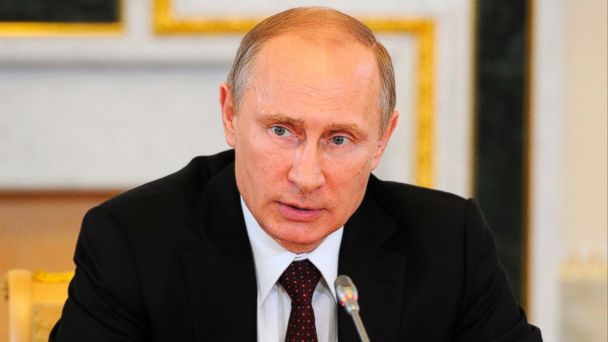Putin Denies Trying to Bring Back the USSR

RIA-Novosti, Mikhail Klimentyev/AP Photo
MOSCOW - Vladimir Putin has been accused of a lot of things recently. He's been called a conquistador and an aspiring tsar.
Today, the Russian president said none of that is true.
"This opinion is wrong. I think it's not something that corresponds with the truth but a tool of the information war," Putin said when asked if he wants to revive the Soviet empire.
"People are trying to label us as such, that we're trying to restore the empire, the Soviet Union, to bring everybody under our influence. But this is totally inaccurate," he told reporters at the St. Petersburg International Economic Forum.
This year, Russia's relations with the United States and its European allies have eroded to levels not seen since the Cold War over mutual distrust about the other's role in the unrest in Ukraine. Still, Putin said he did not believe the Cold War was returning.
"No one needs it, and I don't think it's going to happen," he said, according to Russia's Interfax news agency.
But while Putin has for weeks dismissed Western accusations that Russia's annexation of Crimea was a planned land grab, something he again denied today, his explanation for doing so betrayed political motives.
"We believe that there was an attempt to speak to us in a language of force, and so we made a proportional response," he said, describing a reaction to February's ouster of the pro-Russian former president Viktor Yanukovich in favor of a pro-European government.
The move to annex Crimea led to U.S. and European sanctions, the start of an effort to isolate Russian from the rest of the world. Today, Putin brushed off the notion they would succeed.
"I think that the isolation of such a country is a purely hypothetical possibility. It's impossible," he said.
Yet the forum where Putin spoke offered evidence that the American-led effort has had some effect. The annual event is Putin's answer the World Economic Forum in Davos and a mandatory stop for global CEOs wanting to do business in Russia. After the White House leaned on business leaders not to attend, however, the turnout this year had fewer bold-face names.
Putin is slated to meet President Obama and other Western leaders next month when they attend a D-Day commemoration in France. Putin said that, despite recent tensions, he was not going to avoid them at the event.
"I'll eagerly meet with any of my colleagues," he said.
U.S. officials, meanwhile, said there are no plans for Obama to meet with his Russian counterpart other than perhaps a courtesy greeting when they are together in public.
The U.S. and its allies, meanwhile, remain concerned about Russian interference in Ukraine, warning more sanctions could be coming if the Kremlin continues its alleged meddling.
In recent days, Russia has taken steps, at least publicly, to appear less threatening. It has begun pulling some of its troops back from the Ukraine border, where they were ostensibly training, and said the rest will be out next month. Putin has also publicly shifted his position on Sunday's presidential election in Ukraine, saying Russia will support the will of the Ukrainian people. His comments, however, leave some wiggle room to say the vote is not representative as parts of the restive east will not participate.
In perhaps a sign that Western countries still do not trust him, German Chancellor Angela Merkel and French President Francois Hollande held a rare three-way conference call to discuss the election, according to the Kremlin.
PUTIN WEIGHS IN ON PRINCE CHARLES CONTROVERSY
Putin dismissed reported comments by Britain's Prince Charles that the Russian leader reminds him of Hitler.
"If it is true, it is, of course, unacceptable," Putin told reporters.
"I think he realizes this. He is a well-mannered person. I have met him and other members of the royal family. It's non-royal behavior," he said.
Representatives for Prince Charles have declined to comment on what they say are private conversations. The comments have made waves, not only because of the comparison, but because the British royal family is not supposed to engage in political discussions.
On Friday, a Kremlin spokesman said he could not believe a royal family member had made such a comment.
"Such a remark can be interpreted as historical ignorance," Dmitri Peskov told Russia's Interfax news agency.